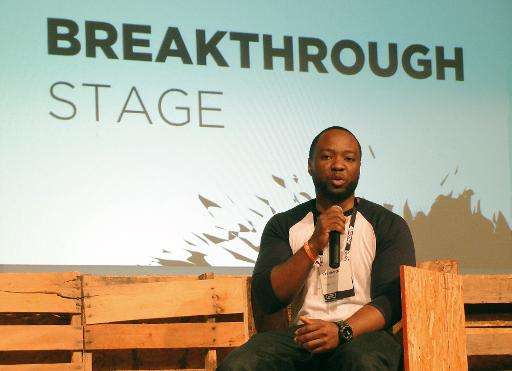Startup Pigeonly helps digitally deprived behind bars

Frederick Hutson was serving time in prison for moving a mountain of marijuana when he came up with a million-dollar idea for Internet startup Pigeonly.
"I was in my cell and wanted photos from my family and knew there had to be a better way to do it," Hutson said at the Collision technology conference this week in Las Vegas, where his company is based.
"My goal was not to build a data company, it was just to make it simple for a guy to get pictures from his girlfriend."
Hutson spent slightly more than four years in prison after being caught in Nevada putting his entrepreneurial zeal to work efficiently routing marijuana shipments through a business he owned.
"It was lots of marijuana," quipped Hutson, who was 24 years old when he was sent to prison in late 2007. "I was always ambitious."
Along with frustration over getting pictures from loved ones outside prison walls, he felt that US inmates were charged astronomical rates for phone calls.
US prisons don't offer Internet or allow mobile phones. Meanwhile, lifestyles have shifted to sharing images, messages digitally.
"I noticed this huge population of people that no one was paying attention to," Hutson said.
Banking on prison smarts
He was in a halfway house for ex-cons in 2012 when he and a partner, Alfonzo Brooks, went to work on Pigeonly. The startup provided online tools for locating inmates, who could typically be transferred and their whereabouts buried in bureaucracy families have trouble navigating.
Pigeonly offered a way for prisoners' families or friends to upload digital images that were then printed and physically mailed to inmates. Pigeonly also provided a way to use Internet telephony technology to enable prisoners avoid high-priced calls from behind bars.
Hutson said the startup ships millions of pictures monthly and has saved families of prisoners more than $7 million in phone charges.
It has also raised more than $2 million in funding, according to its founder.
Hutson said that it initially took a lot of convincing to win over investors who had no experience with the prison system.
"I don't look like the typical technology entrepreneur and I don't have the same background," Hutson said.
"When I go into a room in Silicon Valley to talk to investors, I am the only African-American in the room."
What made him different became a strength, with Hutson making a case that he had expertise solving a problem that most investors knew nothing about.
Pigeonly won over six investors for an initial funding round of $1 million.
"We had no prior notion of what we should or shouldn't do; we just went by our gut," Hutson said of getting Pigeonly off the ground.
"I didn't know about lean startups; I just knew we had to eat every day and we had to make money."
Hutson stressed that his startup's focus is families of loved ones of people in prison, and that the long-term vision for Pigeonly is to address "life needs" such as personal banking services or finding jobs.
"I don't think that profit and doing good are mutually exclusive," Hutson said.
"I am very humbled by all the things we have been able to accomplish. It is crazy."
© 2015 AFP
















